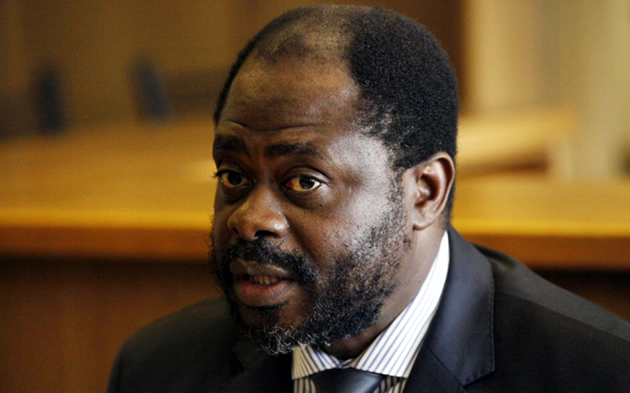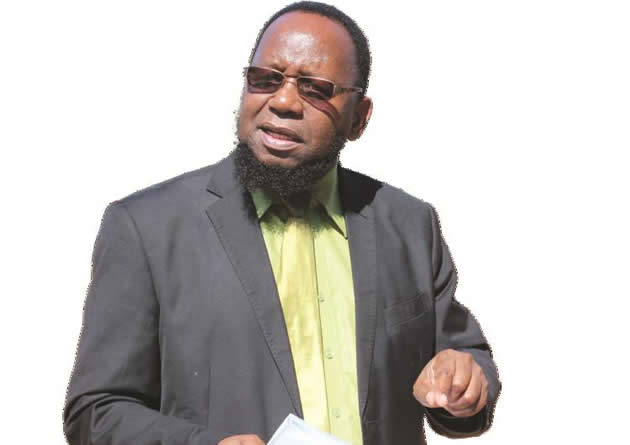Fidel Castro hero of the oppressed

Reason Wafawarova
If there is something that former Cuban leader Fidel Castro will be remembered for after his death on November 25, it is his potent symbolic stature as a spiritual beacon for the world’s oppressed and poorest, especially at the height of the Cold War.
Of course his detractors from the capitalist world will remember him as a loathed ultra-left communist.
From the time Fidel Castro took power from tyrant Fulgencio Batista on January 1 1959, he was determined to pursue his promise to share Cuba’s wealth among all Cubans, affirmatively targeting the poorest citizens.
There is no doubt that Fidel Castro is an internationally recognised iconic hero with legions of admirers and followers across the world, including hundreds of world leaders and statesmen. He was a man who would not hesitate to point his pistol at the powerful to get a fair deal for the poor — a never say die revolutionary so emulated by billions of followers across the world, admired across the ideological divide, especially across the community of university students.
He educated, fed and provided health care for his own people, and provided thousands of medical doctors to developing countries across the world, some of them on the payroll of the Cuban government. He did far more genuine charity work than the world’s hypocritical wealthy nations — the colossus of the North, as he called the capitalist coalition.
Fidel Castro’s Cuba survived 49 years of ruinous economic sanctions from the West, led by the United States, and he is said to have survived more than 600 assassination attempts from the CIA — controlling a vibrant communist state only 90 miles from the shores of the United States. The
United States has for years openly counted this ideological choice as gross provocation of unforgivable proportions.
His opponents often criticised Castro’s philanthropic gestures to the developing world as hypocritical, arguing that Cubans were worse off than the people to whom Castro was sending doctors and Cuban manufactured vaccines.
For nearly 50 years successive US presidents denigrated Fidel Castro as a courier of Armageddon, a blowhard nuisance, a dangerous dictator, a revolution fomenter across and around Latin America (if not globally), a serial human rights abuser, and later an irrelevant sideshow who somehow survived the aftermath of the collapse of the USSR at the beginning of the nineties.
He had one definition for the West, “imperialist enemies of the entire world.”
In 2006, the revolutionary leader transferred power to his brother Raul, on his own terms after reports of failing health, formally resigning from leadership in February 2008.
In March this year Barack Obama became the first US president to visit Cuba in more than 50 years, after announcing plans to restore full diplomatic relations with Havana. Fidel Castro was less than impressed with the overtures, but his brother played good host to the US leader.
JF Kennedy could not stomach Castro at all. His hate for the Cuban revolutionary led him to his humiliating low when he sent a ragtag group of goons to invade the Bay of Pigs in 1961. They were spectacularly massacred and defeated by the Cuban forces.
The frustration on Kennedy’s part was sweet news to the Kremlin, who saw in Castro a brave and useful commander of a socialist state right on the doorstep of the imperialist US
In 1962, Castro allowed the Soviet leader Nikita Khrushchev to base on Cuban soil missiles that could carry nuclear warheads to Washington or New York in minutes. The move almost resulted in the first ever world nuclear war.
There are no known self-adulating monuments or statues for Castro in Cuba, except in many countries of admirers across the world.
Instead the hero is symbolised in his homeland by catchy billboard slogans like “We will overcome!” “Toward Victory always!” or “Motherland or death!”
To other iconic communist/socialist heroes like Maurice Bishop, Samora Machel and Thomas Sankara, Havana became like what Jerusalem is for Christians, what Kingston is for Rastafarians, and what Mecca is for the Muslims — some kind of a Marxist Disneyland.
Every serious revolutionary paid pilgrimage to Havana at the height of Castro’s reign, especially during the Cold War, and that includes the mightily Western-hailed Nelson Mandela at a later stage.
To latter day revolutionaries like Evo Morales and Hugo Chavez, Castro was a political beacon and father figure to the rest of Latin America. He was a symbol of resistance to US capitalist hegemony.
There has always been deep and genuine loyalty to Fidel Castro from most Cubans — regardless of a noisy minority opposition always ready to magnify and exaggerate his shortcomings; perceived or real, often on little more than a whim. They even claimed he imprisoned opponents for crimes as simple as mentioning the word democracy.
Castro’s supporters were roundly condemned as an intimidated lot, brainwashed, gullible, or even plain stupid — and this is the script one has to respect in the West, unless one does not mind being labelled a communist sympathiser.
Criticism by Cuban immigrants to Miami has always been hailed in the West as hard evidence of Castro’s monstrous dictatorship, and many Cubans wishing to stay in America have over the years simply played critics for the sake of getting asylum visas, as has become common with all diplomatic wars pitting the West against any declared enemy state, like Zimbabwe or Venezuela.
There has been a significant shift towards economic liberalisation under Raul, but Cuba has not lost its state control of the economy, following in the footsteps of a liberalising communist China.
Like what has now become a systematic January ritual in Zimbabwe where President Mugabe’s opponents yearly yearn for a “biological solution”, by repeatedly announcing his death on holiday in the Far East, Miami Cubans also became notorious for endless death claims of Castro. Like President Mugabe, Castro would always answer to the demise speculations by making public appearances in healthy shape.
It appears like Castro skilfully managed his departure by preparing his country well for his demise, and he must have departed on his own terms.
Born to a Spanish immigrant, Castro never admired wealthy people in his upbringing, and that is believed to have led him to lead the guerrilla warfare leading up to the 1959 overthrow of Batista. It was a combination of youthful adventure and ideological passion.
Earlier in his life he participated in the fight to free the Dominican Republic from the dictatorship of Rafael Leonidas, and in 1948 he went to Colombia to protest against the Pan-American Union, later the Organisation of American States.
The man was a born revolutionary who started showing his passion for justice in primary school, heavily begrudging schoolmates flaunting family wealth at school.
A qualified lawyer from Havana University, Castro was always a political animal. So powerfully willed was Castro that he surprised many when he embarked on the unthinkable and reckless scheme to take over the army’s Moncada Barracks in Santiago de Cuba.
The attempt was daringly amateurish and comical, resulting in Castro and most of his men being captured.
After being spared summary execution in the aftermath, Castro acted as his own attorney, and gave the ever-famous speech that ended with the popularly recited statement, “Condemn me, it does not matter. History will absolve me.” Generations and generations of Cubans have adored the quote over the years.
After serving two of his 15-year sentence, Castro was released, only to go to Mexico and start a guerrilla war with a group that called itself the July Movement, after the date of the fateful botched Moncada assault. This became the birth of the Cuban Revolution.
On Decemebr 2, 1956, Fidel Castro and 81 followers returned to Cuba from Mexico aboard a second-hand yacht called “Granma,” whose name was later adopted by the Communist Party newspaper in Cuba. All but 12 in the landing party were killed or captured almost immediately. Castro, his brother Raúl and an Argentine physician, Ernesto “Che” Guevara, escaped into the mountains and began organising a guerrilla army.
In the summer of 1958, Batista launched a major offensive against Castro’s guerrilla group. When it failed, it was clear that Batista’s days in power were numbered. He announced to a few close colleagues at a New Year’s Eve party in 1958 that he was leaving the country, and Fidel Castro and his followers triumphantly drove into Havana to take control of the country on January 1, 1959.
Fidel Castro attracted support from across the spectrum within and outside Cuba, including from renowned intellectuals like Ernest Hemingway and Bob Dylan.
He refused cautiously offered economic aid from the United States after he took over power, and from that time economic and political relations between Cuba and the US became increasingly difficult.
The United States claimed Castro had expropriated without compensation $1.8 billion in US property within the first two years of his reign.
From 1960 the economic and political relationship between Cuba and the Soviet Union blossomed, resulting in the United States imposing an embargo on all trade with Cuba in October 1960.
On January 3, 1961, diplomatic relations with the United States were broken.
This set the stage for one of Castro’s greatest triumphs: the defeat of the CIA-organised invasion by Cuban exiles at the Bay of Pigs, which US intelligence officials thought would set off a popular revolt against Fidel Castro.
Cuban military forces triumphantly put down the invasion by about 1 350 CIA-trained fighters; and about 1 200 of the invaders were captured.
Africa will not forget the thousands of Cuban soldiers who came to fight along the Angolans and the Ethiopians in the 70s. Angola was under attack from apartheid South Africa, which was sponsoring Unita rebels in that country.
In addition Castro offered military training missions and thousands of physicians to more than 65 countries across the world.
In 1983 Cuban and US troops faced each other in battle when Ronald Reagan invaded Grenada, arguing that an airport under construction on the island was a threat to US interests and security, because it was partly being funded by Cuban money. Maurice Bishop was overthrown in the process.
This is probably the only war of invasion the United States has ever won. It was a great victory in a mighty war by a superpower against a country of 100 000 people without even an army.
Another of Castro’s notable visionary initiatives was industrialisation, initiating steel production in Cuba to reduce dependency.
For us Zimbabweans Castro was a comrade in arms and in freedom, helping with moral and military support during the liberation war, and with training of education and health professionals after independence, besides sending many physicians to the country.
Time and space permitting, I will pursue in detail the endless achievements of this heroic icon.
Rest in Peace Commandant Castro. Go well the beacon of the international revolution.
Cuba we are one and together we will overcome! It is homeland or death!
Reason Wafawarova is a political writer based in SYDNEY, Australia.











Comments